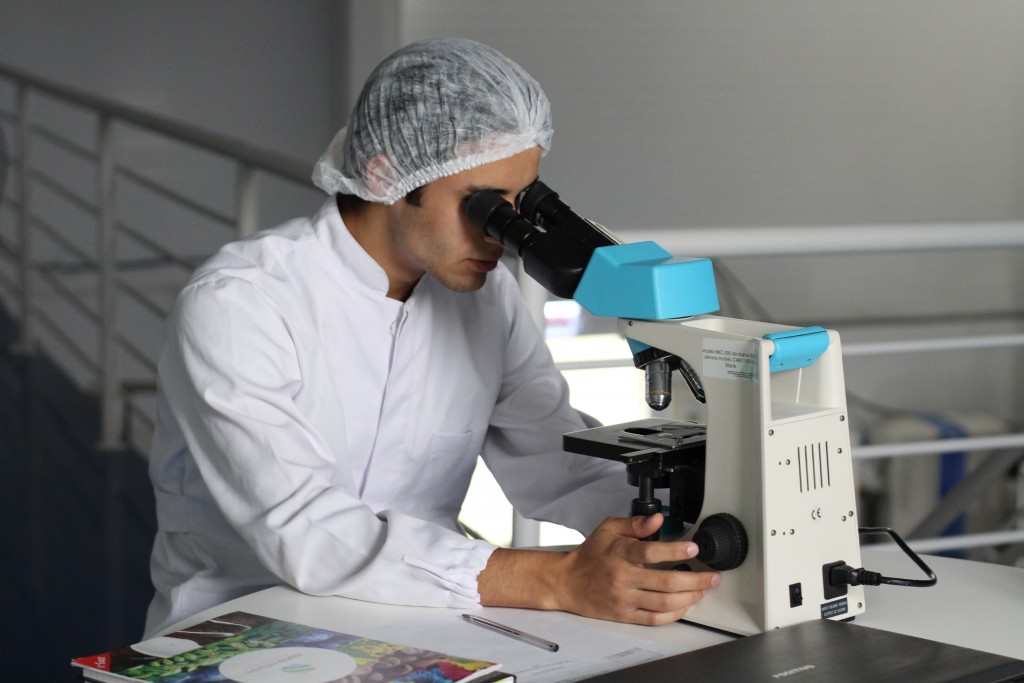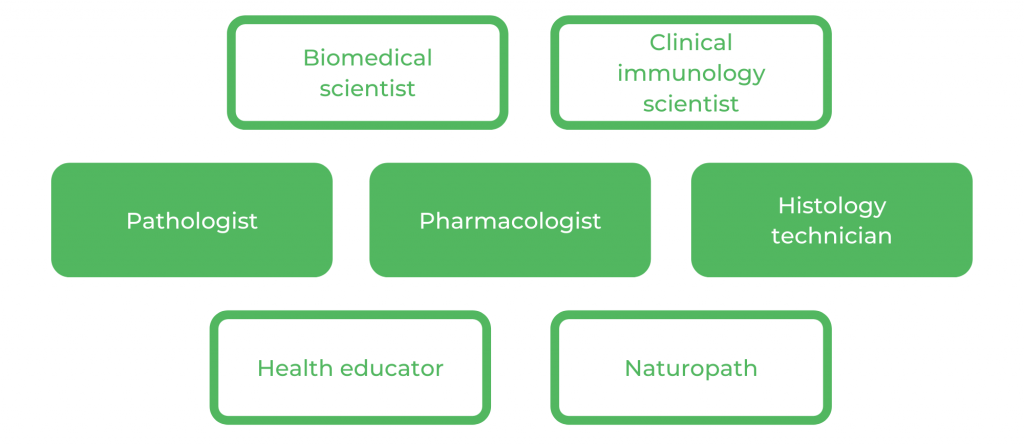
So, you know what to expect when studying UTS Medical Science — take a quick look here if you don’t!
But, you’re really after some inside knowledge?
Well, we’ve got you covered! We spoke with Maddie, who just finished a Bachelor of Medical Science at UTS and asked her all those questions you really want to know!
Let’s dive in!
Why should you study a Medical Science degree at UTS?
Top 3 Pros of a Medical Science Degree
Top 3 Cons of a Medical Science Degree
Mistakes You Shouldn’t Make
Things to Know Before Starting UTS Medical Science
What Makes this Degree Different
Motivations for Studying UTS Medical Science
Potential Career Paths
Why should you study a Medical Science degree at UTS?
UTS Medical Science is a hands-on degree with awesome campus facilities and a supportive faculty culture!

Top 3 Pros of a Medical Science degree
#1: You’ll Cover the Foundations in all Areas of Science
This means that you’ll have a good understanding of both the medical and health-related science subjects, preparing you for any role in research or diagnostics.
“Medical Science at UTS covers a lot of the bases so you’re more of a holistic scientist instead of someone who’s just good at, say microbiology,” said Maddie.
#2: Flexibility with Electives
So, you get to choose four electives over the course of the degree and it’s up to you when you complete them. And you can choose any electives across the entire university!
“People should use their electives to do summer subjects like internships or professional placements — that way they have an easier workload in second and third year,” Maddie recommended.
She added, “I did a research internship that actually counted for six credit points. And how the course was structured, it was really easy to boost your GPA and get a good mark as well. So, having that practical experience while also gaining course credit was really beneficial — I also did it in summer so I got to really focus on it”.
Check out the electives on offer during the summer semester here!
#3: The Uni Culture within the Science Faculty
As former President of the UTS Medical and Health Society, Maddie knows all about the uni culture! It’s fun, inclusive and the Science students are a pretty tight bunch!
“UTS have over four Science based societies — they really integrate you into the faculty, everyone goes to events together and I find the community in Science at UTS is just really supportive rather than a competitive one, which I really enjoyed,” she tells us.
She added, “In science everyone is all about that industry experience, so everyone helps each other out finding internships and sharing opportunities. The vibe is helping each other out and the societies are supportive of your academic, professional development and social life.”
The UTS Science societies are really the best way to make friends and get involved. There are welcome drinks, trivia and pizza nights, the annual science camp and of course, the much-loved Science ball!
Find more details on the science societies here!
Top 3 Cons of a Medical Science degree
#1: The Heavy Workload
As a UTS Medical Science student, you spend a lot of time at uni! You’ll have around six contact hours (sometimes even more) for each of your four subjects a semester on a full-time load.
“Science is a very contact heavy degree — things like practicals and tutorials are compulsory while lectures are usually recorded and put online,” Maddie said.
She added, “It’s intense but luckily if you finish the work early, you can usually leave.”
#2: Challenging to get Grad Roles
It can prove challenging to secure those graduate jobs as the degree is pretty popular and competitive. “A big piece of advice — Science is not the sort of degree, where you can go, P’s get degrees,” Maddie said.
She added, “In science, it’s quite a competitive field in terms of moving on after your undergraduate program — employers really look at your GPAs and how you did in certain subjects.” Her advice was to “intern and get as much experience as you can while studying.”
#3: Internships Are Up to You
We all know that internships are the best way to get experience, extend your network and make your resume stand out when applying for jobs! Unfortunately, there aren’t any internships built into the degree so it’s really up to you.
Maddie said, “While there is some general guidance, you have to be proactive to find internships.”
Don’t forget, you can always do an internship subject as an elective so it counts towards your degree — but you still have to source it yourself!
Any regrets?
“I chose Medical Science as it’s the bridge between health and science. Now finishing my degree, I wish I focused more on the health side as I am doing a Masters of Nursing next year. Choosing different, more health-based electives would have helped with this,” said Maddie.
What do you wish you had known before starting the degree?
#1: You Have to be Really Passionate
“If you want to do a Science degree you’ve got to love uni. You’ve got to put your all into it,” Maddie tells us.
As she told us, it’s a competitive field and your GPA does matter in terms of job prospects. So, you really have to commit to staying on top of everything, turning up to classes and finding internships.
#2: Time Management
Make sure you’re organised because there’s a lot to juggle! UTS Medical Science has a lot of contact hours and you also have to stay on top of it all and find time to study, work, relax and be social.
“I also worked two part-time jobs and ran two societies in my second year of full time uni — so it’s definitely possible to do everything you want to do,” said Maddie.
#3: You Can Modify Your Study Plan
You don’t have to follow the same course structure in the UTS handbook. You can structure your course in a way that works best for you!
Maddie said, “If I knew this, I would have balanced my easier subjects better throughout the degree and done more summer subjects to decrease work load in the main semesters.”
What makes this degree different from the ones offered at other universities?
#1: The Campus Facilities
The UTS Science facilities are state of the art and very, very impressive!
They’re not just used by students, but also researchers — so, that really says something. We’re talking labs equipped with the latest equipment, interactive computer screens and designated areas for group activities.
“I chose UTS mainly due to the facilities on campus. The laboratories you use from first year, like the super labs are just amazing. They’re high tech, they’re brand new as well — you’re in a very new environment that is fresh and clean,” Maddie said.
#2: The Connection with Your Teachers
Most of the lecturers and tutors are currently researching, so you are taught by people who really know their stuff and are connected to the industry.
“Since it is a smaller uni, there’s more of a connection between you and your demonstrators and you and your course coordinator,” said Maddie.
#3: Lower ATAR Cut-off
But that doesn’t mean the quality of the degree isn’t as good!
“I’d say UTS as a smaller uni, it’s not as prestigious as say Sydney Uni or UNSW. The ATAR is slightly lower but it has such high quality teaching and the facilities are a lot newer compared to Sydney,” Maddie tells us.
What inspired you to choose this degree?
Maddie chose this degree because she wasn’t sure whether she wanted to go into health and medicine or science and research — and this degree covers both sides!
She tells us,“I chose UTS because of the location, new facilities and connection to the research industry on campus. When I went to UTS open day I felt really at home and comfortable there.”
What are the possible career paths?

After completing a Bachelor of Medical Science, a lot of students go on to complete postgraduate studies. As Medical Science covers the health and science side of things, there’s a whole range of jobs you could find yourself in:
-
- Biomedical scientist
- Clinical immunology scientist
- Pathologist
- Pharmacologist
- Histology technician
- Health educator
- Naturopath
You could also find yourself in the public health sector, working in hospitals or government departments or even with pharmaceutical companies.
Tanna Nankivell is a Content Writer at Art of Smart Education and is currently in Germany completing a year of study for her double degree in Communications (Journalism) and Bachelor of Arts (International Studies). She has had articles published on Central News – the UTS Journalism Lab and wrote a feature piece for Time Out Sydney during her internship. Tanna has a love for travel and the great outdoors, you’ll either find her on the snowfields or in the ocean, teaching aqua aerobics or creating short films.


